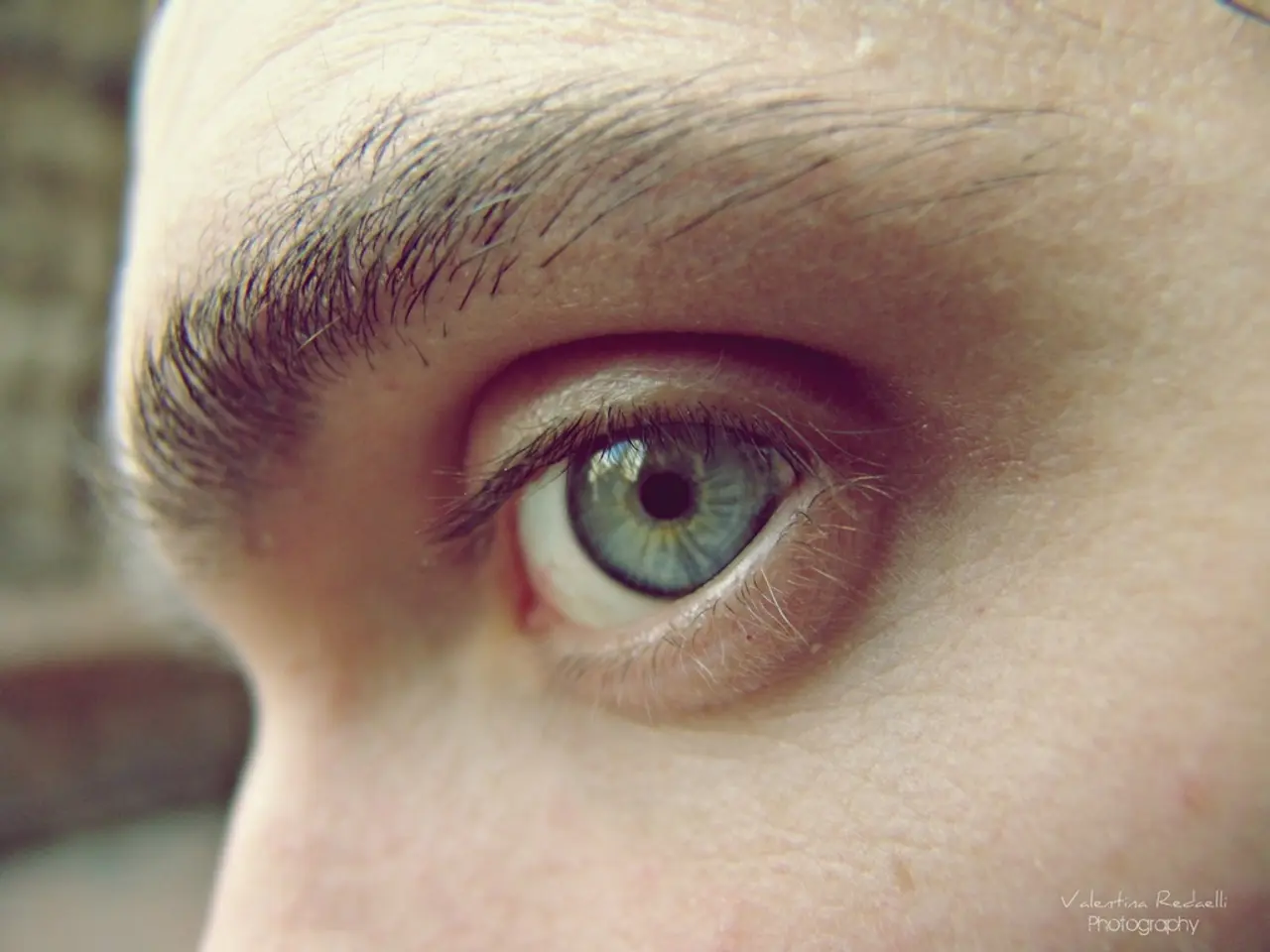Eye Sticking: Causes, Remedies, and Precautions
================================================================================
In this article, we will explore the causes and treatments of sticky eyes, a common issue affecting many individuals. We will focus on three main conditions: blepharitis, conjunctivitis (pink eye), and dry eyes.
Blepharitis
Blepharitis is a condition that inflames the eyelids, leading to symptoms such as inflammation, itchiness, puffiness, irritation, dryness, watery eyes, sensitivity to light, crusty flakes on eyelashes, and discomfort. A blocked tear duct in babies can also cause sticky eyes, which usually clears up without intervention, but a parent or caregiver may need to clean the baby's eyes using a clean piece of cotton wool.
To manage blepharitis, daily warm compresses help loosen blocked oils in eyelid glands. Gentle lid scrubs twice daily remove debris and bacteria to reduce inflammation. During flare-ups, doctors may prescribe antibiotic eye drops or a short course of steroid drops. For persistent cases linked to oil gland dysfunction, oral antibiotics might be used. Consistent eyelid hygiene and avoiding eye rubbing are essential to prevent recurrence.
Conjunctivitis (Pink Eye)
Conjunctivitis, also known as pink eye, is an infection that causes symptoms such as swelling of the conjunctiva or eyelids, pink or red color in the white of the eye, increased tear production, difficulty wearing contacts, crusting of the eyelids and lashes, irritation, itching, burning in the eye, pus or mucus discharge, and swelling of the eyelids.
There are three main causes of pink eye: allergens, viruses, and bacteria. Viral conjunctivitis mainly requires symptom relief such as cold compresses and artificial tears; it resolves on its own within 1-2 weeks. Bacterial conjunctivitis is treated with antibiotic eye drops or ointments to speed recovery. For allergic conjunctivitis, antihistamine or mast cell stabilizer eye drops help reduce inflammation, along with allergen avoidance strategies.
Dry Eyes
Chronic dry eye occurs when the eyes do not produce enough tears, causing symptoms such as blurry vision, watery eyes, burning or stinging sensation, sensitivity to light, redness on the whites of the eye, and discomfort.
Using artificial tears or lubricating eye ointments, especially at night, helps maintain moisture. Good eyelid hygiene supports meibomian gland health, improving tear film quality. Maintaining hydration and a balanced diet rich in omega-3 fatty acids supports natural tear production and eye health.
Prevention and Long-term Management
Long-term treatment and prevention of sticky eyes caused by blepharitis, conjunctivitis, and dry eyes focus on maintaining good eyelid hygiene, managing inflammation, and addressing underlying causes. Consistent eyelid hygiene with warm compresses and cleaning, avoiding eye rubbing, controlling allergies by minimizing exposure to known allergens and using air filtration if needed, proper care and hygiene when using contact lenses, regularly washing hands and avoiding sharing towels or cosmetics to reduce infection risk are essential practices.
If a person has persistently sticky eyes or other signs of eye or eyelid irritation, such as itchiness or swelling, they should contact a doctor. Always speak with a doctor if any of these symptoms affect a baby or child. Waking up with some sticky or crustiness around the eyes is normal, according to the American Academy of Ophthalmology (AAO).
[1] Mayo Clinic. (2021). Blepharitis. https://www.mayoclinic.org/diseases-conditions/blepharitis/symptoms-causes/syc-20375710
[2] American Academy of Ophthalmology. (2021). Dry Eyes. https://www.aao.org/eye-health/diseases/dry-eye-syndrome-list
[3] American Academy of Ophthalmology. (2021). Conjunctivitis (Pink Eye). https://www.aao.org/eye-health/diseases/conjunctivitis-pink-eye-list
[4] National Health Service. (2021). Blepharitis. https://www.nhs.uk/conditions/blepharitis/
- Diabetes, a chronic condition affecting millions, can increase the risk of developing eye-health issues, such as blepharitis or dry eyes.
- Obesity, a common medical condition, is linked to various health problems, including sleep disorders, mental-health issues, and an increased risk of developing conditions like blepharitis and dry eyes.
- The scientific community is making strides in predictive health care, with technologies aimed at early detection of conditions like ulcerative colitis and psoriasis, which can sometimes cause eye-related symptoms.
- Maintaining a balanced diet rich in nutrients like omega-3 fatty acids is essential for overall health and wellness, supporting eye health and reducing the risk of conditions such as dry eyes or macular degeneration.
- COPD, a progressive lung disease, often impacts an individual's fitness-and-exercise capabilities, and can increase vulnerability to bacterial infections like conjunctivitis.
- AQ, an air quality index, is essential in understanding potential triggers for allergic conjunctivitis and other eye-health issues—encouraging allergen avoidance strategies for better eye health.
- Depression, a mental-health disorder, often co-occurs with various physical health conditions, such as diabetes or psoriasis, and may affect eye health indirectly due to reduced self-care or medication adherence.
- Psoriatic arthritis, a form of arthritis affecting psoriasis patients, can cause eye inflammation, resulting in symptoms such as redness, dryness, and pain. Prompt medical attention is crucial in managing these eye-related complications.
- Eczema, a skin condition, is not directly associated with the eyes, but itching and scratching may lead to contact irritation or bacterial infection, possibly triggering eye-health issues like conjunctivitis.
- Blindness, resulting from various causes, can severely impact an individual's quality of life and overall well-being; it is essential to seek prompt medical attention for any eye-health concerns to prevent vision loss.
- Medical professionals often recommend lifestyle changes and treatments to manage conditions like diabetes, obesity, and depression, which can positively impact not only overall health but also eye health and the risk of associated complications.
- Regular eye examinations are crucial in maintaining good eye health, identifying conditions like glaucoma or macular degeneration early, and minimizing the risk of related complications, thus contributing to an individual's overall health and wellness.




